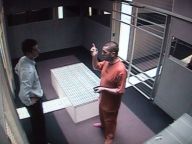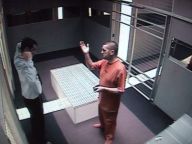Order
The new Prisoner quickly sports that some of the Guards are uncomfortable with their role. He realizes that this makes their position weak and that they are looking for ways out. This gives him an opportunity.
He engineers a situation where he is alone with one of the most troubled Guards. He draws on a concrete problem, the uncomfortable conditions in the prison, to outline his vision:
If you were working in this condition, then you as an employee could well go to the employer and say ‘the condition is unacceptable. I’m not prepared to work in it’… You and I – your group and the group I’m in – both have the problem of the heat… And I think collectively we should do something about it to the people who are running the experiment.
Simple, but compelling. Don’t have Prisoners fighting Guards, have Guards join with Prisoners to fight the experimenters. This is not a matter of ignoring differences between groups and acting as individuals. It is a matter of acting as a single united group to challenge the source of difference.
The Guard listens attentively: “I am most impressed with your new found angle on this”. A seed – a sense of what social identity theorists call cognitive alternatives – has been sown. But it still needs fertile ground in which to grow.
On the basis of his Trades Union background, the new Prisoner has some novel ideas about how to run the prison
He persuades one of the main Guards that these ideas might work
Resource
Ideas in depth: social identity theory

